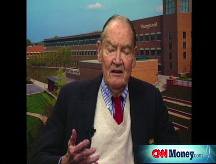Bank CEOs flogged in Washington
The heads of eight top banks faced the fury of Congress. But the execs noted that without TARP funds, credit would have become harder to obtain.
NEW YORK (CNNMoney.com) -- Lawmakers grilled the top executives from eight of the nation's largest financial institutions Wednesday about their apparent lack of willingness to lend to consumers and businesses despite taking in billions of dollars in government aid.
At a closely-watched hearing before the House Financial Services Committee, members of Congress blasted the eight CEOs, including the heads of embattled firms Citigroup (C, Fortune 500) and Bank of America (BAC, Fortune 500), for their actions since the eight banks collectively received $165 billion in capital last fall.
"There is a great deal of anger in the country, much of it justified, about past practices," Barney Frank, D-Mass, the chairman of the House Financial Services Committee, noted in his opening remarks.
Public resentment for these banks has soared in recent weeks amid concerns that some financial institutions have used taxpayer money for purposes other than lending at a time when people across the country are struggling to stay in their homes or losing their jobs.
Wells Fargo (WFC, Fortune 500), for example, had planned a trip to Las Vegas for members of its mortgage team until news reports blasted it as a "junket" that wasted taxpayer money. And Citigroup was scheduled to take delivery of a new $50 million corporate jet before the White House convinced the bank otherwise.
Many of the CEOs at Wednesday's hearing defended their actions, noting that while credit standards have tightened, they were continuing to issue loans. Several of the CEOs added that without government assistance, credit would be even harder to obtain.
"We are still lending, and we are lending far more because of the TARP program," Bank of America Chairman and CEO Ken Lewis said in a copy of his prepared remarks.
Lewis, whose firm has received $45 billion in government assistance from the Troubled Asset Relief Program, or TARP, told lawmakers that his company extended more than $115 billion in new credit to consumers and businesses during the fourth quarter.
Those remarks were echoed by the seven other CEOs testifying Wednesday, including Citigroup chief Vikram Pandit, JPMorgan Chase's (JPM, Fortune 500) Jamie Dimon and John Stumpf of Wells Fargo (WFC, Fortune 500).
That trio, as well as BofA, were among the banks that received the bulk of the first round of capital injections. Wall Street firms Goldman Sachs (GS, Fortune 500) and Morgan Stanley (MS, Fortune 500) as well as Bank of New York Mellon (BK, Fortune 500) and State Street (STT, Fortune 500) rounded out the list.
Merrill Lynch, which was subsequently acquired by Bank of America, also received funding at that time.
Lawmakers hardly appeared convinced, citing anecdotes from local business owners who were unable to get access to credit as well as constituents facing stiffer terms on their credit card accounts and having their home equity lines suspended.
"Start loaning the money that we gave you. Get it on the street!" said Rep. Michael Capuano, D-Mass.
Lawmakers were also quick to seize on the issue of compensation within the banking industry, particularly in light of recent reports that Wall Street firms paid out more than $18 billion in bonuses in 2008.
In addition, New York State Attorney General Andrew Cuomo accused Merrill Lynch Wednesday of "secretly" handing out bonuses before its merger with BofA closed.
But some of the executives that appeared before Congress Wednesday were quick to defend their position, pointing out that they gave up their annual bonus. Several even conceded that the way compensation is doled out in the industry needs to be fixed.
Calls for financial firms to change their compensation practices have grown increasingly louder during the crisis, including tying bonuses more to firms' overall performance as well as instituting so-called "clawback" provisions that reclaim pay from workers whose actions may damage the firm's long-term financial health.
President Obama has already instituted new limits on compensation for executives of banks requiring further assistance from the government. But those rules are not retroactive.
Citigroup's Pandit, who collected a salary of $1 million last year and no bonus, told lawmakers that he would accept pay of just $1 a year and no bonus until his firm returned to profitability. Citigroup has lost more than $20 billion in the past five quarters.
"We will hold ourselves accountable for what we do, and that starts with me," said Pandit.
The possibility of some of the eight banks paying back the government as soon as possible also came up during the hearing.
Several CEOs testifying Wednesday indicated they would like to repay the government ahead of schedule, partly out of fear of more regulation.
Under the current terms of TARP, banks can only buy out the government's stake as long as the money comes from an equity offering of a similar amount that meets government approval.
"That is a legal impediment at this point," said JPMorgan Chase's Dimon.
When Treasury first announced its capital injection plan in October, JPMorgan Chase and Wells Fargo reportedly scoffed at the idea that they should take government funds.
But they were given little choice as former Treasury Secretary Henry Paulson hoped that providing capital to all of the nation's top banks would keep credit flowing and prevent the economy from deteriorating any further.
Several lawmakers noted they were not opposed to banks returning the funds, adding that they would attempt to find a way that would allow them to pay the money back early, something that would probably require new legislation.
"For anyone who contends that you do not need the money and that you did not ask for it, please find a way to return that money to the Treasury Department before you leave town," said Paul Kanjorski, D-Penn. ![]()



